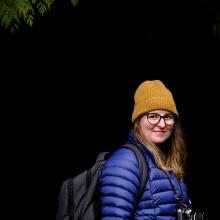The start of the academic year always brings energy and promise. This year is even more exciting than usual because we welcome three new faculty members! Each new faculty member comes with a unique background and impressive teaching portfolios. Get to know each of them better in the article below!
Erin McElroy
Erin McElroy joins us as an Assistant Professor after working as an Assistant Professor at University of Texas at Austin and as a Postdoctoral Research with AI Now Institute. Professor McElroy received a Ph.D. in Feminist Studies from the University of California, Santa Cruz. They have an expansive teaching and research record, particularly around topics of digital media, global technocultures, urban geography, feminist technoscience, housing justice, racial justice, and scholar-activism. They have always been curious about themes of home, displacement, belonging, and unbelonging.
Professor McElroy has a strong ethos of accessible scholarship and their research portfolio is frequently responsive to events happening around them. For example, when Professor McElroy was living in the San Francisco area, they witnessed the “gentrifying dawn of the Tech Boom 2.0” and they responded by creating the Anti-Eviction Mapping Project (AEMP). This work led to the creation of maps, media, data, and tools for housing and racial justice. In describing AEMP, Professor McElroy explains that it “conducts work with rather than for frontline communities” by consciously aligning with mutual aid groups and tenant organizations. Later, as a postdoc, Professor McElroy launched Landlord Tech Watch, a public facing digital project that empowers tenants in better understanding the surveillance technologies deployed by landlords and property managers. Professor McElroy is running the Anti-Eviction Lab at UW now. Professor McElroy has “lots of dreams about future projects and directions the lab can take here at UW, so let me know if you’re interested in getting involved!”
Professor McElroy will publish a book in March, Unbecoming Silicon Valley: Techno Imaginaries and Materialities in Postsocialist Times. The book examines the “Siliconization”’ of Romanian Cities, with Silicon Valley firms taking advantage of Romanian skilled IT workers by moving branches of their firms there, despite Western depictions of such Eastern European situations as illiberal.
With efforts to bring together scholar-activist work globally, Dr. McElroy co-founded the open access, peer-reviewed Radical Housing Journal. They continue their service to the journal with ongoing editorial work.
Professor McElroy will teach GEOG 258 Introduction to Digital Geographies and GEOG 477 Advanced Urban Geography in winter 2024 and GEOG 595 Gentrification, Race & Technology in spring 2024.
Professor McElroy shares that they are “thrilled to be here and be a part of this department.” They visited for a colloquium series that the Department of Geography hosted right before COVID-19, which left an impression on Professor McElroy and “planted the seed of hoping to be a part of it one day.” They expressed enthusiasm around “collaborating with folks within and beyond the department on projects and collective thinking.”
A fun fact about Professor McElroy is that they speak Romanian and have even published several scholarly articles in Romanian! They also have a sweet dog named Lily and promise to bring Lily in for future Smith Hall visits!
Jen Rose Smith
Jen Rose Smith joins the Departments of American Indian Studies and Geography as an Assistant Professor. Professor Smith is a dAXunhyuu (Eyak, Alaska Native) geographer and holds a Ph.D. from University of California, Berkeley, in Comparative Ethnic Studies. Prior to this role at the University of Washington, Professor Smith worked at University of Wisconsin-Madison as an Assistant Professor and at University of California, Davis, as a Postdoctoral Fellow.
Sitting at the intersection of race, indigeneity, and anti-coloniality in Alaska and the Arctic, Professor Smith’s research has been described as path-breaking and crucial for developing and refining Indigenous sciences, land claims, and research methods. She will soon publish her book manuscript, Icy Matters: Race, Indigeneity, and Coloniality in Ice-Geographies, which centers ice to study race and indigeneity. The book investigates more-than-human relations as sites and sources of analysis that are integrally bound up with colonial and racial formations and resistance to those formations. The Department of Geography’s Interim Chair, Michael Brown, posits that “her work is at the nexus of several strands of cutting-edge inquiry in our field: political ecology and nature-society relations, cultural geographies of landscape, racial formations and coloniality, as well as a regional focus on the Arctic.”
In addition to her noteworthy research, Professor Smith participates in the advisory council for the Eyak Cultural Foundation. This non-profit organizes annual language and cultural revitalization gatherings and directs a Cultural Mapping Project in their homelands of Eyak, Alaska.
The Department of Geography is elated that Professor Smith is part of our community. Professor Smith shares the sentiment, noting that she is “looking forward to meeting and collaborating with this wonderful community of geographers, especially around themes or Arctic and indigeneity.” Having newly arrived in Seattle, she is excited about lots of dining options here. Please send her your favorite restaurant recommendations!
Gretchen Sneegas
Gretchen Sneegas joins the Department of Geography as an Assistant Teaching Professor, having earned her Ph.D. in Geography from the University of Georgia, Athens, and an M.A. in Food Studies from Chatham University. Prior to this role, Gretchen worked as a postdoctoral researcher at UW’s School of Environmental and Forest Sciences and at Texas A&M University.
Professor Sneegas has significant expertise around Q-Methodology, water security, and food justice. Her knowledge and work in climate geographies is exactly what our department was hoping to find. Her C.V. boasts several teaching awards and medals for public service. Strongly committed to her work, she aims for “every aspect of my work as a teacher, mentor, colleague, and researcher to contribute to an anti-racist praxis founded on social and environmental justice.”
Professor Sneegas was not in the classroom as a postdoctoral researcher and shares that she is “super excited to get back to teaching.” Luckily for her, and us, she has a full docket of classes this year, starting with GEOG 271 Geography of Food & Eating in autumn quarter. Next up, she will teach GEOG 205 Our Global Environment and GEOG 473 Geographies of Energy and Sustainability in the winter.
Professor Sneegas is a recent transplant to Washington state. She is in the right place as she is a big fan of hiking and camping! She encourages folks to share “any suggestions for parks and trails, especially toddler and kid friendly ones.”

